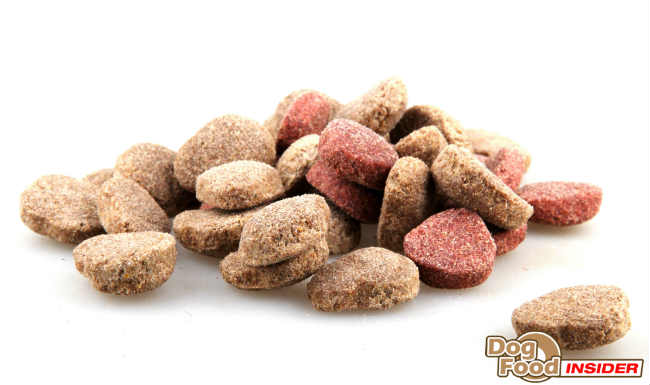
This post may contain affiliate links. We are compensated for referring customers to our affiliate partners.
Many dog owners love to spoil their pets, giving in to their begging behavior with rewards of treats and table scraps. While a few treats here and there will not likely harm your pet, overfeeding can lead to obesity which is a very serious and dangerous condition in dogs. Once a dog becomes obese it has an increased risk for developing some serious diseases and the increased difficulty of exercise makes losing the weight very hard. If your dog is a little overweight it is not something that you should overlook – you need to keep your dog’s best interests in mind and make an effort to help him lose weight for his own health and wellbeing. In this article you will learn about the dangers of obesity in dogs and receive some tips for helping your dog to lose weight. You will also find recommendations for commercial dog food diets that are great for weight loss in dogs.
The Dangers of Obesity in Dogs
When your dog carries around a few extra pounds it may not seem like a big deal. He might be a little slower and less interested in exercise, but many dog owners do not see that as a problem. The truth of the matter is that obesity can be very dangerous for dogs and it only takes a few extra pounds for negative side effects to set in. When your dog is overweight it puts extra strain on his organs – they have to work harder to do their jobs and, as a result, they become more susceptible to disease and other weight-related complications. One of the most common weight-related complications in dogs is diabetes mellitus. This is a condition in which your dog’s need for insulin increases with his weight but his body cannot keep up with the need. Over time, your dog’s pancreas may burn out and stop producing insulin altogether which can become a very serious problem.
In addition to diabetes, being overweight also puts your dog at risk for developing bone and joint problems. About 25% of overweight dogs develop serious joint complications like arthritis, joint pain, and hip dysplasia. When your dog is overweight it puts extra strain on his ligaments as well which can lead to damage. The anterior cruciate ligament in your dog’s knees are extremely prone to strains and tears – if the ligament tears, your dog will be reluctant to use it which could lead to further weight gain due to inactivity. Surgery is the only effective treatment for this problem.
While all dogs can develop obesity, certain breeds are more prone to becoming overweight than others. Some of the breeds most at-risk for obesity include dachshunds, beagles, Labrador retrievers, cocker spaniels, collies, shelties, and basset hounds. Some of the other complications dogs are likely to develop in conjunction with obesity include:
- Increased blood pressure (hypertension)
- Heart disease
- Difficulty breathing
- Decreased endurance and stamina
- Heat intolerance
- Decreased liver function
- Increased surgical risk
- Reproductive problems
- Digestive disorders
- Decreased immune function
- Coat and skin problems
- Increased risk for cancer
- Decreased lifespan
As you can see, obesity in dogs is no laughing matter – it can lead to some very serious complications and shorten your dog’s lifespan by several years.
Tips to Help Your Dog Lose Weight
If your dog is carrying a few extra pounds you should take action to help him lose weight before he becomes obese. Once your dog is obese it can be difficult to get him back to a normal weight because exercise becomes very difficult for him. When it comes to weight loss in dogs, you should aim for a loss of about 0.5 to 2% of your dog’s body weight per week – that equates to about ¼ to 1 pound per week. As is true for humans, you do not want your dog to lose weight too quickly. Unfortunately, determining the right weight loss diet for dogs can be difficult because energy needs vary so greatly according to your dog’s age, breed, and size. Most weight loss protocols for dogs recommend a 15% to 20% reduction in daily portions.
When it comes to putting your dog on a diet you do not just need to reduce the amount of food you give him. Your dog still needs certain nutrients to remain healthy and just cutting his portions may not be the best way to go about it. In most cases, a commercial diet specially formulated for weight reduction is the way to go. These diets are high in fiber and low in fat while still providing your dog with the protein he needs to maintain muscle mass. In addition to changing your dog’s diet you should also try to make sure he gets a little bit of daily exercise. Because obesity can put a lot of strain on your dog’s joints and bones you do not want to over-exercise him. Speak to your veterinarian about how much exercise your dog can safely handle and stick to moderate levels of physical activity like a 15-minute walk twice a day. Incorporating active playtime with games like fetch can be beneficial as well.
Recommended Dog Foods for Weight Loss
If your dog is carrying around a few extra pounds, you may want to switch him to a weight reduction diet. A high-quality weight reduction diet will not just be low in calories – it should be high in fiber but low in fat to ensure a low energy density. It should still contain plenty of protein to help your dog maintain healthy muscle mass as well. Below you will find several recommendations for commercial weight loss diets for dogs.
Wellness Core Reduced Fat Dog Food
Like all of Wellness’ dog food formulas, this Wellness Core Reduced Fat Dog Food is a meat-based diet. This formula is made with 25% less fat than the original Wellness Core formula but it is still grain-free and gluten-free. Wellness Core Reduced Fat Dog Food is made with fresh deboned turkey, turkey meal, and chicken meal so you can rest assured that it contains plenty of protein. It also contains digestible gluten-free carbohydrates like potatoes and peas plus some healthy fats from chicken fat and ground flaxseed. This formula is complete and balanced for everyday feeding, plus it is supplemented with antioxidants, omega fatty acids and probiotics. If you are looking for a weight loss diet for your dog that doesn’t require a sacrifice of nutritional value or quality, consider this Wellness Core Reduced Fat Dog Food formula.
Acana Light and Fit Dog Food
This Light and Fit formula from Acana is rich in protein, made with fresh chicken and whole eggs in addition to wild-caught flounder. In addition to being high in protein, Acana Light and Fit Dog Food is low in carbohydrates and doesn’t contain any high-glycemic grains. This formula is composed of 60% chicken, eggs and fish, 20% fruits and vegetables, and 20% low-glycemic Alberta oats. The fact that this formula is free from high-glycemic grains makes it different from many “light” dog foods. High-glycemic foods like corn and rice are broken down quickly in the body which can lead to spikes in blood sugar and stored fat. Steel-cut oats, on the other hand, are a low-glycemic food that is absorbed slowly by your dog’s body to decrease fat storage and to reduce insulin resistance.
Premium Edge Healthy Weight Reduction Dry Food
This Healthy Weight Reduction dry food formula from Premium Edge is made with fresh chicken as the top ingredient. This formula is rich in protein but low in carbohydrates to help promote weight loss – it has a protein content around 44% but a fat content of just 12%. This Premium Edge Healthy Weight Reduction dry food formula contains a variety of high-quality ingredients in addition to the fresh chicken – examples include salmon meal, fish meal, egg, and chelated minerals plus a variety of fresh fruits and vegetables. This formula is supplemented with additional nutrients to support a healthy coat and skin as well as a healthy immune system. If you are looking for a weight reduction formula that still provides your dog with the nutrition he needs, consider this Premium Edge Healthy Weight Reduction dry food.
Obesity in dogs is no laughing matter – it can put excess strain on his organs, bones, and joints which can contribute to some very serious problems. If your dog is carrying a few extra pounds you should take action to help him lose weight before he becomes obese. Switching your dog to a weight reduction diet and giving him a little extra daily exercise will help him get back to a healthy weight.
